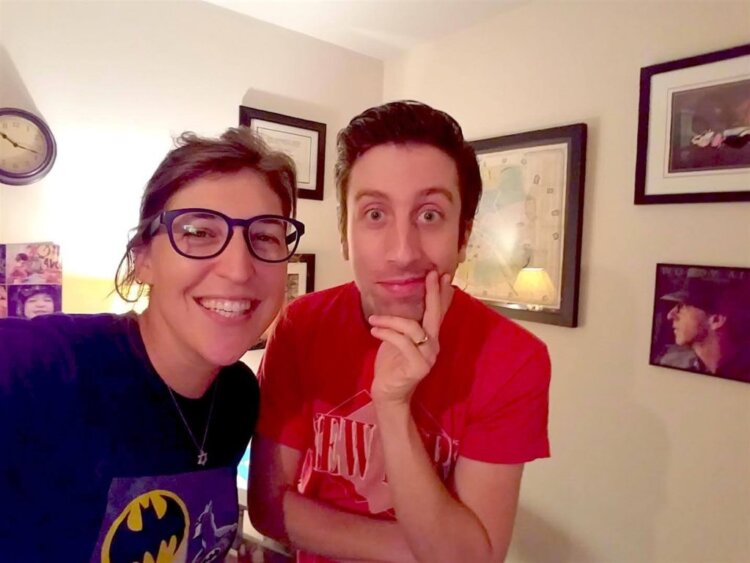
Most of you know Simon Helberg from his work as Howard Wolowitz on “The Big Bang Theory.” I like to say that I am Simon’s biggest fan both on- and off-screen, as he is an incredible and generous comedian, a loving father and husband, and a sensitive and brilliant person who I’m honored to work with. His latest movie, “Florence Foster Jenkins,” will make you fall in love with him in a new way, as he portrays the pianist for the most successful (but musically horrible) opera singer in history. Simon’s performance is memorable and complex and he is truly adorable. Seeing him on the big screen was a huge treat for me, and I decided to interview him about the differences between playing this role and playing Wolowitz, including how he went about creating such a lovable and fascinating character for this beautiful movie which I highly recommend you see! So read on… – M.B.
Mayim Bialik: Thank you for talking with me, Simon! I absolutely fell hard for “Florence Foster Jenkins” and especially found your portrayal of the character so moving. For people who don’t know what the movie is about, tell us your thumbnail sketch of it, please.
Simon Helberg: Well, it is about the most well-known opera singer of all time, despite her being the worst opera singer of all time, Florence Foster Jenkins, played by Meryl Streep. It’s a true story, and it took place in 1944. Everyone knew that she had the most atrocious voice, except for her, and despite her voice being atrocious, she managed to triumph and sing at Carnegie Hall and go on to be the biggest selling artist of Melotone Records. Her record is still talked about and was on David Bowie’s list of top ten albums of all time. So she became an absolute sensation despite having zero singing ability.
Mayim: And the way that that happens – and I don’t want to give away the movie so I won’t – but there is a very elaborate web of people around her who have a combination of fear and love, and that sort of constructs this web of deception which goes further than anyone anticipated, correct?
Simon: Yeah, we were calling it a conspiracy of kindness, and my character plays the accompanist with the impossible name of Cosmé McMoon. I see him as this chaste, pure, innocent, fresh-off-the-boat guy wandering into a socialite, cosmopolitan, elite scene of artists and sophisticates and he lands his dream job, but, unbeknownst to him, it turns out to be what is essentially The Twilight Zone. So he becomes an accomplice in this conspiracy of kindness to insulate this woman and protect her, and to help her live out her dream. But ultimately he learns more through this process: by the end of the movie he values – probably more than opportunism, or reputation – a love of the “doing of the thing,” as opposed to how well what you’re doing is done. So there’s this growth and appreciation for the joy of living out your dream or your passion as opposed to how well it’s executed.
Mayim: When you think of a Meryl Streep movie you think, “Oh, it’s about Meryl Streep”, but what’s really neat about a lot of [director and producer] Stephen Frears’ films – and this film is no exception- and what’s so compelling about the way this film is written is that we really get to see the full progression of each of those characters in a complete character arc (yours and Meryl’s and Hugh Grant’s) and that’s really, really special because obviously sometimes we actors are simply supporting actors, but this is a real showcase for each of you. Can you talk a little bit about that? Because what we do here on Big Bang Theory has us as the same character for going on 10 years and although our scripts change weekly, our characters essentially don’t. To put yourself into that kind of movie world, where in two hours you basically you have to communicate an entire life, is very challenging. For people who don’t know much about the actor’s process, can you talk about what’s that like for you?
Simon: Well, it’s kind of like a big treasure hunt, sort of, to find the gold in each moment, and some might call it “milking it” or “mining it.” With this character, it’s not like he has tons of dialogue or tons of speeches, but his presence in the film is very significant.
Mayim: You do a lot of physical comedy also – a lot of your facial expressions tell a lot about the character.
Simon: Yeah, and the music is a huge part of his story as well. The script is so well-constructed and I think when a script is really well-written, it’s almost like each character is the star of their own story. Obviously the director sets the point of view of the film, and the script determines that, and I wouldn’t say that I am the star of the movie –
Mayim: To me you are!
Simon: (laughs) What I mean is that in terms of each character, when something is really well put-together, there is sort of a beginning, middle, and end to each character – that’s an arc. I had to really figure out who this character was and how that goes is this: you start with the script, and look for how this writer has painted him. How do you interpret that? I had to do a lot of research but there actually wasn’t a ton of information on Cosmé. What I found is that he was born in Mexico but moved very quickly to Texas, and then to New York, and I thought to myself, “Maybe English was not his first language…”- not that I’m going to give him an accent, but I thought that his origins must’ve contributed to a feeling of perhaps being different.
Building this character is a matter of trying to build a psychological profile of a person, as if you spent an hour with somebody and tried to figure out what they are really like.
And he had an affinity for body-building and muscle men magazines and if that was an indication of his sexuality it seemed, in the way that I read the script, that he might not even be aware of his sexuality yet. So there is a scene with a gay man putting his arm around Cosmé and Cosmé says, “Corbin’s friends all seem so personable,” and Hugh Grant says, “Oh, I bet they do…” and I thought to myself, “Oh…Cosmé doesn’t even know what that could mean.” And that was a huge clue in constructing this character: I thought to myself, “Imagine how innocent and pure you’d be to be that unaware of what’s going on with your sexuality.”
Mayim: Did you ever have to do that with your Wolowitz character? Meaning, is that something you did 10 years ago and now it’s just so automatic, or is it different? I think it’s different in sitcom, but I wonder if you do.
Simon: Yeah, I mean, you don’t want to get too masturbatory with your process… You get a pilot [opening episode] script for sitcoms and there’s just less information on the character, because there’s less pages and also, in sitcom, you just want to do whatever makes the work better. Some people will write a biography of their character. I don’t do a lot of things that some people might do and I probably do a lot of crazy things that ‘normal’ people wouldn’t do! [laughs] For this show, when I first got the initial script, I did a tremendous amount of work on figuring out who I thought this guy was and a lot of that as I look back is our ways to alleviate just fear, too. Meaning: there are things that we do to take up the time and space with the energy we have because of the anxiety about performing, or being an actor. There’s a fine line between preparation and superstition in some ways.
Now as I am doing the show, it is definitely a bit second-nature. But I think when we started, I would remind myself of what the character or elements or physicality for this show. The same thing happened when I filmed “Florence.” It was a 2 ½ month shoot, but when I started filming, I would have kind of like a checklist of things that helped me portray Cosmé the way I wanted to and then by the end of the shoot, it was more second-nature. It’s always interesting when you watch a movie because it’s –
Mayim & Simon (together): – filmed out of order –
Simon: And you’re like “Oh My God, that was the first scene” and sometimes you see how you’ve gotten better but in the wrong order.
Mayim: (laughing) Such is life.
Simon: Yeah.
Mayim: I had one more question about the music part, you’re a very humble, but very, very accomplished musician and you get to show that off in the movie. Did you audition for this part? Were they looking for musicians to play your part, or was it just a great coincidence that you happened to be able to do the musical part?
Simon: I did not have to audition for it. It was eerily smooth and easy to get the part, in a way that I was unaccustomed to. It came about because the casting director, Kathleen Chopin, had cast a film that I did called “We’ll Never Have Paris,” that I directed with my wife [Jocelyn Towne] . So she told Stephen she had the guy to play Cosmé, and that was me.
And Stephen is a very trusting man, and maybe it’s that his attention span isn’t that big and he just didn’t want to meet with anybody else, but he met me and it’s hard to even say that we hit it off because he somewhat lives on almost a different spectrum… We had a great talk – er, I talked – and he kind of grumbles…He cared very little about the acting part and the character because he knew that according to the casting director, I was a great actor. All he really wanted to talk about was how well I could play the piano, could I act and play, could I play classical. I had played Jazz and Contemporary music in rock bands, and trios and things all through high school and played very well for a 16-year-old piano player, but not by any means professional at this point, and I had never played classical like this.
Alexander Desplat is the composer for the score and he’s brilliant and he told Stephen that he had to hire an actor that plays the piano. Meryl wanted to sing it, and so Alexander told Stephen that he needed to have a guy who can really play…And then we recorded all of the music at Abbey Road, which was a dream. So this was two dreams: to work with Meryl and to go to Abbey Road, happening at once. [Simon is an enormous Beatles fan.]
I felt bad because we were sort of destroying the integrity of the studio with our butchering of opera! And after we perfected this imperfect album of opera, Stephen said “Great, now that I know you can do this, we’ll shoot it all live.” So we recorded it all live and they basically threw out the recordings. And then there we were, but, yeah, I had a few months to lock myself in a hole.
Mayim: So you had to learn a character, and then also a musical score.
Simon: Yeah. I learned the music and then I learned it very, very well – enough so that I could basically follow the sinking Titanic that was Meryl’s character, and then patch up the hole, or put an anchor down or steer her to shore because you have to know something backwards and forwards to, like, intersperse dialogue with it and be open to the flexibility of the actors in a scene.
And then there was also learning how classical musicians sit, hold themselves, walk…how do they look? How would my character do things; how would he look and sit as a classical pianist sitting and playing this music? And after all of that, as you get on to the set, you just throw it all away and trust that it’s there which was a big lesson or a hard lesson to sort of learn, which was to trust myself as much as Stephen trusted me and to sort of trust that the work would be in your bones.
Mayim: That’s unbelievable. This is such a movie of detail and nuance, and so to hear some of the backstory is so impressive– now I like it even more!
Thank you, Simon. This was fascinating.
Simon: You’re welcome!
“Florence Foster Jenkins” is out in theaters now! And you can also catch Simon Helberg as Howard Wolowitz on “The Big Bang Theory” when the new season premieres on Monday, September 19 on CBS.




 Read More From Mayim
Read More From Mayim
Grok Nation Comment Policy
We welcome thoughtful, grokky comments—keep your negativity and spam to yourself. Please read our Comment Policy before commenting.